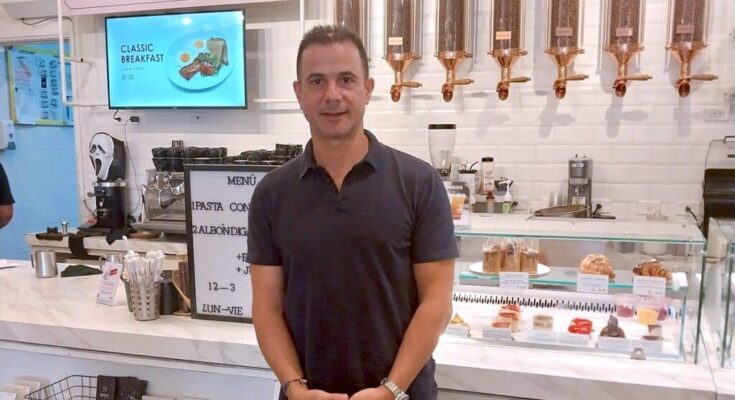
Thirty years after his first endeavor in the industry, the Greek businessman and cafe owner shares the recipe for crafting long lasting success in the challenging market of Panama.
By Rebeca Medina Quereguán
“I am a bit of a hybrid,” Antonio Androutsos says with a smile, as the clatter of plates and chatter fills the air at one of his latest hits, Toños Café Bakery in Panama City.
Dubbed after his childhood nickname, the coffeehouse now boasts over five locations across town. Much like himself, the international menu focuses on highlighting Panamanian specialty coffee, while still staying true to his Greek roots. “There will always be a Greek salad on the table because it’s so universal,” the Greek cafe owner and businessman of Panama notes.
“I started working in restaurants in Athens at fifteen years old during school breaks. At twenty, I had my own business, which was a cafeteria. It all began there,” he recalls. This early start laid the foundation for a career spanning decades, one defined by perseverance, risk-taking, and a deep love for food.
“You can’t be afraid to take risks; it is a very risky business, and very few people dare to do it,” he says. “Sometimes you have to gamble everything you have—sell your apartment, your car—and take a chance with a business because you believe in it so much.”
As the founder of some of Panama’s most recognized food chains, including Athanasiou Bakery and Suvlas, Androutsos has not only experienced the rewards of success but also the challenges that come with growth.
Over the years, he’s had to make difficult decisions, including selling some of his initial ventures to focus on new opportunities. “Each project has had its own struggles, first of all because of the costs. It costs a lot to build a new business, a restaurant, a concept,” he admits. “And then there’s human resources, the day-to-day operations, persuading the client, and staying on for the long term. This is a business of endurance, not of speed.”
According to the American Restaurant Association, around 60 percent of restaurants close within their first year, and 80 percent fail within the first five years. From poor location choices and flawed menus to underestimating operational costs, the reasons for failure are diverse, but the path to survival might be just as hazardous.
“This business is the only one I know of where you can be involved twenty-four seven, and I am a twenty-four seven man. On Sundays and Saturdays, you’ll see me here working. This is my home. I’ve had opportunities to earn more money elsewhere, but it’s not about how much you make but about being satisfied and happy,” Androutsos comments on his hands-on approach to management.

Androutsos’ culinary journey across borders from Greece to Panama
The Greek community’s influence on Panama’s service industries is significant, and Androutsos is proud to be part of that legacy: “They’ve opened the way for us. It started over a hundred years ago with the first Greeks on fishing boats, being gastronomic suppliers, setting up markets, and restaurants,” explains the Greek cafe owner and businessman of Panama.
“Now, wherever you go, Panamanians know what baklava is, Greek yogurt, gyro, tzatziki, souvlaki—it’s incredible,” he reveals. “Even in supermarkets, you can find several types of feta cheese, Greek olive oil, and wines. The penetration of Greek culture is quite significant.”
Related video:
For Androutsos, food is deeply personal. “My hobby is to have a good time with friends and family and cook for them,” he says. This passion was instilled in him in his childhood, when he would watch his mother and grandmother cook.
“In Greece, everything revolves around food. A Greek will invite you to their office or house, but first, they’ll take you to eat. You can’t do anything that doesn’t involve food. In that way, you learn to treat your clients as great friends that you invite to eat with you,” he says, crediting his upbringing for his sense of hospitality.
Although he understands the importance of maintaining cultural authenticity while also adapting to local tastes, the blending of traditions is ultimately meant to appeal to both expatriates and locals alike.
“When you label something as ‘Greek cuisine,’ you need to offer an authentic Greek product because you’re giving the customer a piece of the culture,” he explains, referencing the straightforward approach he initially used with Meze, a restaurant he once owned that is now a well-established local favorite.

Expanding horizons for a Greek businessman in Panama
Androutsos’ philosophy on business growth is deeply grounded in intuition. “You have to follow your gut. There is no scientific study that tells you exactly when or where to grow. It’s a feeling you learn over time.”
This instinct served him well when he opened a new branch of Toños Café Bakery in Brisas del Golf in Panama City, after numerous customers suggested it. “It was a great success,” he says, emphasizing the importance of listening to those around him.
“We are also producing our own coffee,” Androutsos reveals, alluding to Barú Black Mountain. The farm, located in Volcán, Panama, cultivates premium varieties such as Caturra, Catuaí, Pacamara, and Geisha, and is now the primary coffee supplier for Toños Café Bakery.
Looking ahead, Androutsos has ambitious plans to expand his model internationally, promoting Panama’s celebrated coffee abroad while continuing to innovate locally. His next venture includes a Greek-inspired restaurant in the city, solidifying his role as a culinary pioneer in Panama’s vibrant food scene.



